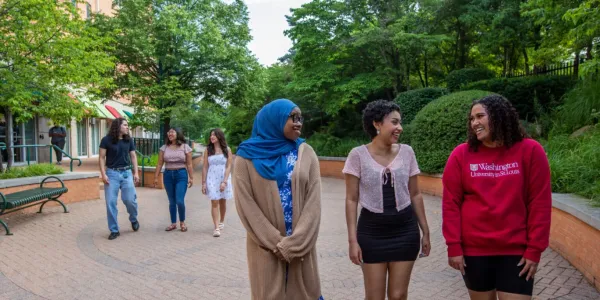The Mellon Mays Undergraduate Fellowship program supports original research projects in the humanities and social sciences.
Five sophomores have been selected for the 33rd cohort of the Mellon Mays Undergraduate Fellowship (MMUF) program.
The program is sponsored by the Mellon Foundation and seeks to advance humanistic inquiry that broadens the understanding of society. The fellows work with a faculty mentor on a research project in the humanities or social sciences for two years.
The MMUF program seeks to attract scholars who can build meaningful relationships with faculty members and expand the project in their second year. Fellows who enter a PhD program in a Mellon-designated field are eligible for loan forgiveness.
“Mellon’s emphasis on multivocality resonates through the projects of the new cohort,” said program coordinator Wilmetta Toliver-Diallo, senior assistant dean of advising in the College of Arts & Sciences. “These scholars join a tradition of honoring untold narratives and experiences that enrich the academy.”
The new Mellon Mays fellows join five juniors who entered the program last year: Subratha Araselvan, Ciara Avelar, Fatuma Ibrahim, Nissi Yorke, and Oluwatoni John.
Meet the 2025 Mellon Mays fellows:

Ariel Chavez
Majors: English and Latin American Studies
Mentor: Ignacio Sánchez-Prado
Project: “Preserving Roots in Exile: Salvadoran Cultural Identity Post-Civil War”
This project explores how war and forced migration have shaped the Salvadoran diaspora in the United States, distinguishing it from other Hispanic communities. Through archival research, interviews, and cultural analysis in key hubs like Los Angeles and Washington, D.C., the project will examine how Salvadorans preserve and adapt their identity across generations. By incorporating literature, visual arts, and community events, this project amplifies silenced voices and reshapes the narrative around migration as a necessity, not a choice.

Ethan Crandall
Major: Global Studies
Mentor: Zachary Manditch-Prottas
Project: “Knowledge of Self: The Cultural Impact of Conscious Hip-Hop in Chile and the United States”
Hip-hop has stood as a pillar of resistance and activism for Black Americans since the 1970s. With its growth and popularity, hip-hop became a phenomenon giving voice to marginalized communities around the world, including hegemonic Chileans afflicted by the Pinochet military dictatorship and Indigenous Mapuche people facing forced assimilation in Chile. This project investigates the genre as an oral history and examines its role in expanding both recognition and internalization of social, political, and economic structures by marginalized communities in the U.S. and Chile. It will seek to understand the degree of cultural impact that hip-hop has in fostering ideological awareness and advocacy with Chilean and American minorities.
Maddie Gomez

Majors: English and Political Science
Mentor: Michael Sanders
Project: “The Politics of Possibility: Gender, Race, and the Reimagining of Power and Freedom in Speculative Fiction”
Speculative fiction serves as a site of resistance, challenging and reimagining dominant forms of power through an analysis of social, political, and cultural structures. Its departure from reality provides a critique of present-day systemic inequalities when confronted by characters of vastly different worlds. By analyzing narratives through the lens of feminist, political, and critical race theory, this project seeks to deepen the understanding of speculative fiction as a crucial space for uplifting marginalized perspectives — a space that not only disrupts existing hierarchies of power but also offers transformative visions for the future.
Jordan Kim

Major: American Culture Studies
Mentor: Ariela Schachter
Project: “Racial Hierarchies in the Courtroom: Asian American Defendants, Black Victims, and the Construction of Race”
This project explores how legal narratives in minority-on-minority cases reinforce racial hierarchies and anti-Blackness within the U.S. legal system. Inspired by People v. Soon Ja Du (1991), this study investigates how courtroom rhetoric and legal decision-making contribute to racial stratification. By examining courtroom dynamics in cases involving Asian American defendants and Black victims, this project interrogates how legal arguments, judicial framing, and racial stereotypes shape perceptions of culpability, victimhood, and justice. Grounded in ethnic studies, this project will build upon concepts of racial triangulation and systemic white dominance to analyze how Asian Americans are positioned as both racialized minorities and potential enforcers of anti-Black legal structures.
Nikki Nguyen

Majors: Educational Studies and Political Science
Mentor: Michelle Purdy
Project: “Education, Immigration, and Identity: The Political Socialization of Vietnamese Americans”
Asian Americans are a diverse and growing electorate with political behaviors shaped by migration, culture, and structural forces. Vietnamese Americans have historically shown stronger Republican support than other Asian ethnic groups, often attributed to anti-communist sentiments and their migration experience. However, political alignment has shifted across generations. This research will examine the evolving political identity of Vietnamese Americans, focusing on how education influences civic participation and partisan affiliations among first-generation students. It will also explore the impact of historical trauma and intergenerational dynamics on political engagement within the community.





